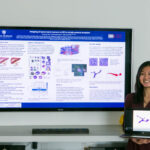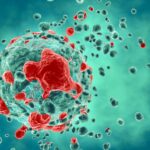Drug-chemo combo destroys challenging breast cancer stem cells

The journal article described in this news release was retracted by PNAS on Sept. 2, 2022. The retraction notice may be viewed on the PNAS website.
Researchers affiliated with Johns Hopkins Physical Sciences-Oncology Center (PS-OC) have shown that combining chemotherapy with an agent that blocks a certain cancer survival protein holds the key to fighting one of the the toughest forms of breast cancer.
Only 20 percent of patients with what are known as “triple-negative” breast cancer cells respond to chemotherapy. PS-OC associate director and Johns Hopkins professor of medicine Gregg Semenza demonstrated in a recent study that chemotherapy actually enhances triple-negative cancer stem cell survival by switching on proteins called hypoxia-inducible factors (HIF). But when combined with currently available and FDA-approved HIF-inhibiting drugs, such as digoxin, Semenza said, chemotherapy shrank tumors.
Mice with implanted triple-negative breast cancer stem cells were treated with a combination therapy comprised of the HIF-inhibiting drug plus the chemotherapeutic drug paclitaxel. That combo treatment decreased tumor size by 30 percent more than treatment with chemotherapy. Furthermore, Semenza’s study showed that combining digoxin with the a different chemotherapeutic agent called gemcitabine “brought tumor volumes to zero within three weeks and prevented the immediate relapse at the end of treatment that was seen in mice treated with gemcitabine alone,” a press release on the study stated. Clinical trials will be needed to verify these results.
Debangshu Samanta, Ph.D., a postdoctoral fellow in the Semenza lab, was the lead author on this research published online in the Proceedings of the National Academy of Sciences. Additional authors include Daniele Gilkes, Pallavi Chaturvedi and Lisha Xiang of the Johns Hopkins University School of Medicine.
Read the PNAS article here.
Visit the PS-OC website here.
For all press inquiries regarding INBT, its faculty and programs, contact INBT’s science writer Mary Spiro, mspiro@jhu.edu or 410-516-4802.
Latest Posts
-
 Q&A with PSON Intern Jocelyn Hsu
August 19, 2021
Q&A with PSON Intern Jocelyn Hsu
August 19, 2021
-
 Start Up Founders from Johns Hopkins Aim to Stop Spread of Cancer
August 3, 2021
Start Up Founders from Johns Hopkins Aim to Stop Spread of Cancer
August 3, 2021
-
 Protein Appears to Prevent Tumor Cells from Spreading Via Blood Vessels
July 15, 2021
Protein Appears to Prevent Tumor Cells from Spreading Via Blood Vessels
July 15, 2021


